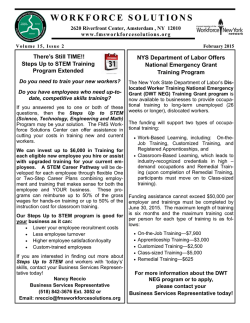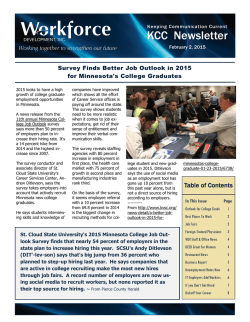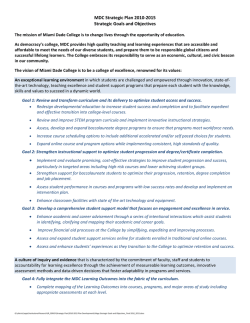
Local Plan Modification - North Central Wisconsin Workforce
Local Plan Modification Workforce Investment Act Program Year 2014 July 1, 2014 – June 30, 2015 North Central Wisconsin Workforce Development Board Table of Contents I. NEW OR REVISED LOCAL PLAN SECTIONS ............................................................................... 1 A. Changing Local Economic Conditions ............................................................................................. 1 B. Changing Service Delivery Strategies .............................................................................................. 1 Targeted Recruitment ............................................................................................................................ 2 NCWWDB Establishing “Work Ready” Candidates ............................................................................ 2 Adult Eligibility Policy Change ............................................................................................................ 2 II. PERFORMANCE ELEMENTS ........................................................................................................... 3 III. YOUTH ELEMENTS........................................................................................................................... 4 IV. OTHER MODIFICATION UPDATES ................................................................................................ 4 V. OUTSTANDING ISSUES THAT MAY BE DELINEATED IN THE COVER LETTER ................. 4 Attachment A – Adult Priority of Service................................................................................................. 5 Attachment B – ITA Policy ...................................................................................................................... 6 Attachment C – Youth Council Membership Form ................................................................................ 12 Attachment D – WIA Local Supportive Services Policy ........................................................................ 15 Attachment E – Local Elected Officials ................................................................................................. 19 Attachment F – WDB Board Members................................................................................................... 20 I. NEW OR REVISED LOCAL PLAN SECTIONS Delineate any new or revised service delivery strategies (if different from those stated in the 2011-12 comprehensive Local Plan) in response to WIA formula allocation reductions, local economic conditions, performance improvements, private-sector needs, etcetera. Examples include areas such as job center on-site partner shifts, infrastructure efficiencies, training provider expectations, provider reimbursement policies, business services, and/or competitive process for awarding subcontracts. A. Changing Local Economic Conditions A new report by the Conference Board, titled “From Not Enough Jobs to Not Enough Workers,” predicts that labor shortages will become a rapidly-growing problem as baby boomers retire. The beginning of this trend is being experienced in North Central Wisconsin. During the depth of recession, North Central Wisconsin’s unemployment rate reached 11.5% (February 2010). Between July 1, 2008 and June 30, 2010, 7,307 known workers were dislocated from their jobs. In June 2104, the unemployment rate in North Central Wisconsin hovered just above six percent. Moreover, an aging population and migration patterns will continue to exacerbate a declining labor pool. The median age in North Central Wisconsin is almost 42 years, compared to 38.3 years for the State, and 37.0 years for the country. The percentage of the population over 60 years old already exceeds the population under the age of 20. Compounding the problem is the out-migration patterns of young adults, working age, between the ages of 21 and 35. Over the longer-term, these fundamental demographic shifts will result in changing labor market priorities both for workers and employers. According to the latest data from the U.S. Bureau of Labor Statistics, Wisconsin gained 28,141 privatesector jobs in all of 2013 — a 1.2% growth rate. In North Central Wisconsin, the regional manufacturing sector experienced a 2% growth rate, slightly outpacing the State’s growth rate. Based on EMSI projections over the next five years, healthcare jobs are expected to growth by 11% and transportation jobs by eight percent in North Central Wisconsin. Anecdotal evidence, as expressed by regional employers, also suggests an increasing labor demand in the informal technology sector. B. Changing Service Delivery Strategies On January 20, 2014, the North Central Wisconsin Workforce Development Board adopted four strategic goals, two of which directly impact service delivery strategies: Goal 2: Begin to build a pipeline of future workers to meet future (4+years) employer demand in the region Goal 3: Align employers, workforce, education, economic development and other partners to increase business competitiveness Demographic shifts in North Central Wisconsin have necessitated development of new strategies to “build pipeline” of future talent in high demand, high growth occupations. This includes greater interface between the workforce system, employers, K-12 education, and higher education. This work has begun and will continue to be implemented through employer-led industry alliances. There is growing evidence that industry clusters are an effective organizing framework for positively impacting workforce development activities. Employers within a single industry engage with the workforce system to identify its specific talent needs and map strategies to address talent challenges. NCWWDB has helped establish two industry alliances – the Central Wisconsin Metal Manufacturers Alliance (CWiMMA) and the North Central Health Care Alliance. CWiMMA has 45 industry members and is actively engaged in building North Central WI Workforce Development Board Local Plan Modification – Attachments 1 pipeline (“Heavy Metal Tour” for 8th graders, welding competitions, etc) and re-skilling incumbent workers (though a consortium DWD Fast Forward grant). The Health Care Alliance will continue to focus on development of effective career exploration and clinical experience platforms. A third industry alliance, Information Technology, is in the formative stage. But, if current demographic trends continue, NCWWDB cannot focus only on building pipeline to meet the demand for skilled workers. The potential labor pool can be broadened to include targeted populations which have historically participated in the labor market at lower levels. These populations can comprise a key element of the future growth needed in the workforce, and include: older workers, women, students, long-term unemployed, ex-offenders and individuals with disabilities. As example, the U.S. Bureau of Labor Statistics projects that whereas about seven million people 65 or older are in the labor force today, by the year 2050 that number will have almost tripled to 19.6 million. Older workers will comprise a greater percentage of the workforce in the future than they do today. BLS also reports that participation rates of working-age men stands at 75 percent while participation rates of working-age women is just over 60 percent. Among the nation’s hardest-to-employ are ex-offenders. In fact, only about half of formerly incarcerated people find employment within a year of release. Intervention such as vocational education, softs skills training, and comprehensive job search assistance not only improve re-employment opportunities and expand the potential labor pool, but substantially reduces recidivism rates. Another targeted population is the long-term unemployed. According to the Wisconsin Department of Workforce Development, 7,180 individuals exhausted their unemployment benefits between January 1, 2013 and March 31, 2014 in the North Central region. Long-term unemployment is higher today than at any point before 2008. Targeted Recruitment: Although NCWWDB will still be responsive to any individual seeking services through the job centers, it will specifically recruit candidates for special training activities based on employer needs. This will be achieved through a strengthened relationship with all job center partners. As example, UI claimants attending Re-Employment Sessions (RES) will be directly recruited for any current training opportunities directly tied to employment. Further, greater emphasis will be placed on providing a general assessment of need and direct program referrals for all jobseekers entering the job centers. This practice will improve operational efficiency and employment outcomes. And, it will prepare the job center partners for implementation of the new WIOA (Workforce Innovation and Opportunity Act) requirement for common “intake, case management and reporting systems”. NCWWDB Establishing “Work Ready” Candidates: Implementation of the “Skills Wisconsin” CRM has necessitated the determination of “work ready” candidates in WDA#6. To ensure that the Skills Wisconsin Salesforce tool is populated with candidates who are ready and able to work, some basic criteria were developed. Those criteria include: completion of a computer skills assessment, a WorkKeys assessment, and interviewing and resume writing skills workshops. “Work ready” candidate profiles are entered into the Salesforce system and “matched” with current employer job orders. Adult Eligibility Policy Change: In an effort to best meet employer demand and to increase training in the key sector of Advanced Manufacturing, recruitment of a broader pool of candidates is necessary. Effective June 27, 2014 the NCWWDB revised and adopted a local policy regarding WIA Adult eligibility. The local policy now North Central WI Workforce Development Board Local Plan Modification – Attachments 2 includes eligibility for those individuals who are unemployed or underemployed defined by metrics provided by DWD/OEA. See Attachments A & B. II. PERFORMANCE ELEMENTS Complete the following items related to performance: A. List the WDB's PY14 performance standards for each common measure: o Adult and Dislocated Worker (DW) Entered Employment o Adult and DW Employment Retention o Adult and DW Average Earnings o Youth Placement in Employment or Education o Youth Attainment of a Degree or Certificate o Youth Literacy and Numeracy Gains [§661.350(a)(4) All Youth under Common Measures PY14 Placement in Employment or Education 74% Attainment of a Degree or Certificate 84% Literacy and Numeracy Gains 40% Adult Performance under Common Measures PY14* Entered Employment 84.8% Retention Rate Average Earnings Dislocated Worker Performance under Common Measures 89% $11,823 PY14 * Entered Employment 87% Retention Rate 93% 6 Months Earning Increase/Change North Central WI Workforce Development Board Local Plan Modification – Attachments $15,800 3 III. YOUTH ELEMENTS A. Attached is the form that must be used to submit the current membership of the Youth Council. Please make certain that the appointed members are placed in the correct WIA-required categories. [§ 661.335] See Attachment C IV. OTHER MODIFICATION UPDATES Please submit any other updates since the submission of the PY 11 comprehensive local plan including WDB membership, Local Elected Official changes, agency organizational charts, policies, etcetera. In addition to the local policies referenced above, the following policies have been approved and/or revised since November 2011: V. Adult Priority of Service (revised - 2014) – Attachment A ITA Policy – Attachment B Youth Council Membership Form – Attachment C WIA Local Supportive Services Policy – Attachment D Local Elected Officials (revised - 2014) – Attachment E WDB Board Members (revised) – Attachment F OUTSTANDING ISSUES THAT MAY BE DELINEATED IN THE COVER LETTER North Central WI Workforce Development Board Local Plan Modification – Attachments 4 Attachment A – Adult Priority of Service NORTH CENTRAL WISCONSIN WORKFORCE DEVELOPMENT BOARD ADULT Priority of Service Policy All applicants to the WIA Title 1B Adult Program must meet the local eligibility requirements prior to enrollment and prior to receiving training services. These requirements are: a. Must be at least 18 years old b. U.S. citizen, or legally authorized to work in the U. S. c. Each male 18 years of age or older born on or after January 1, 1960, must present evidence that he has complied with Section 3 of the Military Selective Service Act; d. Considered unemployed or underemployed. County level underemployment guidelines are provided annually by Department of Workforce Development Office Economic Advisors; e. Residency in the following priority order: 1. Resident of the nine counties comprising WDA 6 and/or workers who were last employed in WDA 6; and 2. Wisconsin resident not located or working in WDA 6 (this will be considered on a case-by-case basis by the case manager and supervisor) Prior to receiving training services, participants are required to meet the following conditions: a. Meet all program expectations and appointments; b. Select training programs that are considered an “in-demand” occupation; c. Select training programs that are listed on the state-wide ITA list of approved vendors and programs; and d. Possess or willingness to obtain the required academic skills necessary for the selected training; In the event a wait list is necessary due to limited funds, the WIA-contracted provider will adhere to the Adult Prioritized list of targeted groups: #1 Current WIA participants #2 Veterans/eligible spouse (as defined in TEGL 10-09) #3 Non-covered persons The WIA-contracted provider must confirm the local eligibility requirements, and document on the wait list the date the applicant was added. (The Priority of Service/wait list will be reviewed and updated every program year to ensure the candidates are still interested in participating in WIA) Revised approved - 6/26/14 3118 Post Road, Suite A Stevens Point, WI 54481 Phone: 715-204-1640 Fax: 715-204-1649 Website: www.ncwwdb.org North Central WI Workforce Development Board Local Plan Modification – Attachments 5 Attachment B – ITA Policy WIA TITLE I-B INDIVIDUAL TRAINING ACCOUNT POLICY AND PROCEDURE LOCAL PROGRAM GUIDELINES BACKGROUND Under the Workforce Investment Act (WIA) Individual Training Accounts (ITAs) are the mechanism by which enrollees in the Adult and Dislocated Worker funding streams receive funding for training services. (WIA, Section 134(d)(4)(G)). Specific instructions for the use of ITAs are found in the WIA Federal Regulations at Sections 663.400 through 663.430. The purpose of these Regulations and the Act is to create a public training system that emulates a market. In this market, participants become the customers who select training programs and training providers from approved lists, based on the concept of informed choice. Informed choice means knowledgeable case managers who have no financial interest in the decisions their customers make, and help their customers select effective programs and providers. Informed choice also means a “consumer reports”- style system of information will become available to help inform customers of the training outcomes achieved by the customers of all training providers and programs on the approved list. The only type of training services for which ITAs are not required is customized training and On-the-Job Training (OJT). **The provision of OJT services for WIA Adult and Dislocated Worker participants is considered on a caseby-case basis with prior approval by the Program Coordinator. **The provision of training services for self-employment options is considered on a case-by-case basis with prior approval by the Program Coordinator, and conditions set forth in the Business Track policy. For additional guidance from the state level, see DWD WIA Program Guide for Adult and Dislocated Worker Services Sections II. 1, 8, and 9. ELIGIBILITY FOR ITAs Individuals eligible for ITAs must meet all of these requirements: 1. Have received an objective assessment which includes the gathering of information on academic achievement skills, aptitude, computer skills, interests, and work history; 2. Have received career counseling including labor market information on occupational projections; 3. Have received Intensive Services, including the development of an individual employability plan, and have been unable to obtain or retain employment. 4. Have been determined by program staff to be in need of training services and to have the aptitude and basic skills to successfully participate in the selected program of training services; North Central WI Workforce Development Board Local Plan Modification – Attachments 6 5. Have selected programs of training services which are directly linked to demand occupations* in WDA 6 or in another area of Wisconsin to which they are willing to relocate; 6. Be eligible for enrollment and training in accordance with WDA 6 priority of service which, for the Adult Program, is unemployed or underemployed. County level underemployment guidelines are provided annually by Department of Workforce Development Office of Economic Advisors; 7. Have insufficient resources available to meet associated training needs documented by completion of a “Financial Need Analysis” form (see attached example); 8. Agree to apply for financial aid when appropriate and according to ITA policy, “Satisfactory Progress for Initial and Continued Funding – Filing for Financial Aid”; 9. Agree that any employment during the training period must follow the “Policy and Procedure for Temporary Employment”; and 10. Agree to adhere to the requirements in the ITA “Customer Agreement.” DEMAND OCCUPATION * A “demand occupation” appears on current labor market information which the case manager determines and documents in the Individual Employment Plan (IEP) that shows a strong probability the participant will be employed in a training-related occupation which meets the earnings expectations for either the Adult or Dislocated Worker Program, depending upon the program enrollment. TWO-TIERED REVIEW PROCESS The WIA Provider must establish a written process for reviewing payment exceptions, payment for retake of failed classes, granting training period extensions, approving computer software classes not included in the approved program, waiving the assessment requirement, failure to maintain satisfactory GPA, failure to meet documentation requirements for an ITA, and any other items deemed appropriate by the Program Coordinator. This process must be at least two-tiered (i.e. involve a further review by at least one person above the case manager/program staff). The WIA Provider must submit a copy of this policy/procedure and any subsequent modifications to the NCWWDB. APPROVED PROGRAMS AND COURSES ITAs can be used only for a) training - individual classes or entire programs - to prepare individuals for “demand” occupations as defined in these guidelines and b) from training providers that appear on the State List of Approved Training Providers (www.wisconsinjobcenter.org/ita/presentation/SearchBy.aspx) ITAs will be used for only the courses required for program completion as specified in the school catalogue or program curriculum outline. Additional classes that are added to the program to increase marketability will not be funded through WIA unless they fulfill the elective requirements. Using the two-tiered review process, the Program Coordinator may grant an exception for computer software classes or other courses which are appropriate for the intended occupation. PAYMENT ITAs pay for tuition and fees. Payments will usually be made directly to the training provider on a cost reimbursement basis or as reimbursement for actual charges. NCWWDB will annually determine funding guidelines based upon the average costs or rates for full-time students at Wisconsin technical colleges and universities. Graduate level training will be funded at the average for local university undergraduate funding. Specialized training provided by proprietary schools (e.g. truck driving, computer programs) may be funded up to the total average cost for a 2 year technical college program. The maximum amount available per participant will be the average cost or rate/semester at either a 2 year or 4-year school (whichever is most comparable) X 5.5 semesters. Using the two-tiered process, program staff may request a waiver for extra North Central WI Workforce Development Board Local Plan Modification – Attachments 7 expenses from the Program Coordinator. Waivers will be granted when the exceptions are well-documented and will be based upon availability of training, individual financial need, and availability of funding. Whenever possible, assistance will be provided for 100% of the unmet financial need for tuition and fees. If funds become limited, participants may receive assistance on less than a 100% basis. For the Adult Program at the time ITA requests exceed the funds available, the WIA Provider must establish a waiting list based upon the ITA request date. The Dislocated Worker Program must also establish similar waiting lists but take steps along with the NCWWDB staff to obtain additional grant funds from the state or federal government. Approval of these grants will determine the extent to which students will be funded. Applicants/Participants approved for training outside of the service delivery area will receive the average amount of tuition and fees established within the service delivery area. These rates will be either technical college or university rates, depending upon the type and length of the training program. The case manager will make this determination and inform the participant about the current rates being applied. If participants choose to enroll in double majors/programs, WIA will only pay for one major/program. The participant will choose which program the ITA covers provided that the program meets all requirements of this policy. Participants who fail a class or classes will be required to pay for the retake of the class. If a participant must withdraw from a class or classes, the payment for the retake(s) will be based upon the amount refunded to WIA. If no money is refunded to WIA, participants will be responsible for the entire cost of the retake(s). Using the two-tier review process the Program Coordinator may make exceptions for extenuating circumstances (e.g., unexpected family situations). Payments for books will be determined by the case manager upon review of the total program costs, participant resources, and the participants’ completed “Financial Need Analysis” form. DURATION Applicants/Participants will be strongly advised to complete training within the shortest time period possible. Technical Colleges, Proprietary Schools, and 4-Year Colleges and Universities: Participants are expected to complete within 104 training weeks (i.e. weeks when classes are in session). Special program requirements, availability of classes, waiting lists, prerequisites and basic skills upgrading will be taken into consideration and can extend the training period beyond 104 weeks. Using the two-tiered review process the Program Coordinator may grant a waiver to the 104-week training period requirement. Graduate Level Training – If individuals have already received JTPA or WIA funds for undergraduate level training, then they are ineligible for graduate level training funded by WIA. If JTPA/WIA has not funded undergraduate level training, then the participant must meet the same 104 training week, financial aid requirements and other program responsibilities expected of technical college, proprietary school and 4 year college and university students. SATISFACTORY PROGRESS FOR INITIAL AND CONTINUED FUNDING Career Assessment. Prior to approval of ITA funding, training applicants or WIA participants must have completed some form of structured or formal career assessment. The case manager must keep written documentation of this assessment in the participant file. North Central WI Workforce Development Board Local Plan Modification – Attachments 8 If the formal assessment is not available prior to the start of a term or semester, a training applicant or WIA participant may be approved for ITA funding if the assessment requirement is met through other short-term testing means. If the assessment does not match the chosen training, the case manager will re-evaluate the participant’s program selection prior to approval of funding. Training applicants or WIA participants requesting ITA funding for short-term, part-time, or continued full-time training may have the assessment requirement waived by the Program Coordinator using the two-tiered review process. Satisfactory academic progress must be taken into consideration. Training applicants or WIA participants requesting ITA funding for graduate level training may have the career assessment waived with written documentation citing the availability of jobs within the chosen occupation. Grades. Training applicants or WIA participants requesting assistance for training must be at or above a cumulative Grade Point Average (GPA) of 2.0 for the Adult Program and 2.50 for the Dislocated Worker Program. Case managers must document cumulative GPA in the participant files by retaining a copy of current grade reports or transcripts. If participants fall below the cumulative level during their participation in the WIA program, they will be put on “probationary” status for the upcoming semester. If they fail to achieve the cumulative level at the end of the probationary semester, WIA funding will be reviewed and may be denied until the cumulative GPA level is met. Using the two-tiered review process the Program Coordinator may review extenuating circumstances on an individual basis and approve continued funding. Documentation of Grades and Class Schedule. Applicants/Participants will be required to supply a copy of a) each term/semester’s grades and b) the upcoming semester’s class schedule to the WIA case manager. Copies of both documents must be in the clients’ file prior to the beginning of the semester or funding will not be approved. Filing for Financial Aid. Applicants/Participants who are eligible students will be required to file for Financial Aid every school year. The Financial Aid documentation must be in the client’s file prior to the beginning of the semester or funding will not be approved. Documentation may be in the form of an award or denial letter, Internet printout showing award/denial or statement from the local Financial Aid office. Attendance Forms. Applicants/Participants must complete attendance forms each month. Forms must be signed by instructors and/or counselors, as well as by the participants. Forms must be returned to the WIA case manager within five days of month’s end. Tardy attendance forms will be cause for immediate review of WIA funding. Contact with Case Manager. Participants must maintain regular contact with the WIA case manager. Any information requested by the case manager and/or WIA program must be submitted to the office in a prompt manner. PROCEDURES All applicants and participants requesting an Individual Training Account must complete the “Individual Training Account Request” form prior to incurring any costs or prior to beginning training. If necessary, the case manager will assist participants in completing this and other forms. Documentation necessary for ITAs includes: 1) assessment information, 2) an Individual Employment Plan, 3) the ITA Request form, 4) North Central WI Workforce Development Board Local Plan Modification – Attachments 9 financial needs analysis, 5) financial aid information, 6) class schedule, 7) ITA Customer Agreement, and 8)Temporary Employment Policy and Procedure. Requests from participants to establish Individual Training Accounts (ITAs) will be routinely approved if: 1. Sufficient unobligated funds exist for that purpose (or, for Dislocated Workers only, if there is a reasonable expectation that additional funds are likely to be obtained from state or federal WIA reserves, or from TAA, to fund such training), AND 2. The type of training, by occupation, is documented in the Individual Employment Plan (IEP) found in each participant's file, AND 3. The IEP is accompanied by any other additional supporting documentation identified during the IEP development process to show that the nature of the training to be provided is adequately suited to the interests, aptitudes and abilities of the participant (e.g., testing and/or assessment results or other means), such that the participant is shown to be in need of and able to benefit from the proposed training), AND 4. For Adults and Older Youth, the average earnings of workers entering the occupation for which training will be provided are sufficient to meet the prevailing local performance standards for WIA Adults or Older Youth on an aggregate annual basis. For Dislocated Workers enrolled in the local formula-funded grant, the average earnings of workers entering the occupation for which training will be provided are sufficient to meet the prevailing local performance standards of all enrolled workers on an aggregate annual basis. For Dislocated Workers enrolled at any point in a grant funded by state or federal WIA reserves, the earnings expected upon successful completion of training will be sufficient to satisfy, on an aggregate basis by the end of the grant award period, the average wage specified in the applicable state or federal Dislocated Worker grant application . AND 5. The occupation for which training will be provided meets the definition of “Demand Occupation” in this policy. Case managers, who perceive the need for technical assistance on the likelihood of eventual employment in a training-related occupation, or the prevailing wage for individual occupations, are advised to seek further guidance from the Program Coordinator. If any of these five items are not met, the case manager must submit the “Individual Training Account Request” form and supporting documentation for approval or denial to the review staff designated by the Program Coordinator. If the case manager or review staff has any reason to doubt any information provided by the participant, the information will be verified prior to approval of the training request. No payment will be made unless the “ITA Request” form has been completed and signed by the client and case manager. The case manager will be responsible for determining that all costs of any requested assistance are allowable, allocable, reasonable and necessary. All payments will be made on a cost reimbursement basis to either participants or vendors. If the vendor requires pre-authorization, the case manager must complete a purchase order (PO) or a similar authorization document after training approval. North Central WI Workforce Development Board Local Plan Modification – Attachments 10 Once the case manager or review staff has approved the training request, the case manager will complete the “Funding Authorization” form (see attached sample) and distribute copies of a “Funding Authorization” form as instructed on the form. The case manager will either give the participant a “Funding Authorization” form to be taken to the vendor or will forward the form along to the appropriate vendor. For review and payment the case manager will forward the original request form, copy of class schedule and copy of a “Funding Authorization” form to the WIA Provider The designated WIA Provider will receive the invoice/billing from the vendor, review for accuracy and submit to their fiscal agent. The case manager will document in the Individual Employability Plan (IEP) that the participant meets the ITA policy requirements and that the assistance has been approved, including identification of the training program, estimated duration and cost. The case manager will also see that the participant's ASSET service screens are updated to enroll the participant in the appropriate component. Revision approved 6/26/14 North Central WI Workforce Development Board Local Plan Modification – Attachments 11 Attachment C – Youth Council Membership Form Youth Council Membership Form Contact Person: ______Jane Spencer 715-204-1645______________ WDA#______6____ WIA-Required Youth Council Category § 661.335 Members of the Local Board, such as educators, which may include special education personnel, employers, and representatives of human service agencies, who have a special interest or expertise in youth policy Members who represent service agencies, such as juvenile justice and local law enforcement agencies Members who represent local public housing authorities Parents of eligible youth seeking assistance under WIA T1 B Member Name, Title, Organization, Address, Phone Number and E-mail Address Robert Fausti, Center Director Blackwell Job Corps RR1 BOX 233A, Laona, WI 54541 715-674-7649, [email protected] Dana Jackson-WIA/Ed Director Wi Indian Consortium PO BOX 39 Odanah, WI 54861 715-682-7111 [email protected] Andrew Hartwig, School Resource Officer Wausau Police Dept, 515 Grand Ave, Wausau, WI 54403 715-261-7856 [email protected] Vacant Penny Huffman, Housing Case Manager Forward Service Corporation 51 A North Brown St. Rhinelander, WI 54501 715-365-7844 [email protected] vacant Parent Angie Roggenbuck, Parent 1301 Townline Rd Apt F Wausau, WI 54403 715-846-8070 [email protected] Jody Stevens, Parent 5211 Rib Mountain Dr Wausau, WI 54401 715-551-6273 [email protected] Kathleen Ruenger, Parent Wausau, WI 54401 715-370-0686 [email protected] North Central WI Workforce Development Board Local Plan Modification – Attachments 12 Individuals, including former participants, and, members who represent organizations, that have experience relating to youth activities Robert Kvatek, WIA Participant 1433 W River Dr, Stevens Point, WI 54481 715-310-3234 [email protected] Rebeca Argiro, Counselor Department of Vocational Rehabilitation 364 Grand Ave, Wausau, WI 54401 [email protected] Teri Phalin, PK-16/Admissions Coordinator Nicolet Area Technical College PO BOX 518, Rhinelander, WI 54501 715-365-4464 [email protected] Dan Nowak, Dean of K-12 Programs NTC 1000 W Campus Dr. Wausau, WI 54401 715-803-1782 [email protected] Xiong Vang, High School Career Coach MSTC 500 32nd St N Wi Rapids, WI 54494 715-422-5521 [email protected] Lisa Curless, Project Director-Adams County Promise Neighborhood 201 W. 6th St. Friendship, WI 53910 608-339-3213, #1022 [email protected] Connie Sersch, Health Educator Marshfield Clinic Youth Net Program 1000 N. Oak Ave. (F1C) Marshfield, WI 54449 715-384-3939, #112 [email protected] North Central WI Workforce Development Board Local Plan Modification – Attachments 13 Members who represent the Job Corps, if a Job Corps Center is located in the local area represented by the council Robert Fausti, Center Director Blackwell Job Corps RR1 BOX 233A Laona, WI 54541 715-674-7649 [email protected] Rory Jefferson, Residential Living Mngr Blackwell Job Corps RR1 BOX 233A Laona, WI 54541 715-674-7676 [email protected] North Central WI Workforce Development Board Local Plan Modification – Attachments 14 Attachment D – WIA Local Suportive Services Policy NORTH CENTRAL WISCONSIN WORKFORCE DEVELOPMENT BOARD WDA 6 – WIA Title 1 B SUPPORTIVE SERVICES POLICY The North Central Wisconsin Workforce Development Board (NCWWDB) and its programs consisting of WIA Title 1 – Youth, Adult and Dislocated Worker recognizes the importance of providing supportive services as allowable expenditures to participants, provided that the provision of such services is included in the participants’ individual assessment and plan, and directly tied to an approved WIA Title 1 activity. To this end, the NCWWDB will allow a variety of supportive services under specific guidelines. YOUTH INCENTIVES This policy recognizes that WIA youth participants may benefit from the provision of a reasonable incentive as a motivational tool when an activity that is related to the overall goal has been achieved. Incentive resources are limited and are not an entitlement. The use of incentives will be pre-determined and agreed upon by the participant, WIA case manager and local program supervisor, and is directly related to the participant’s documented goal. The provision and amount of any given incentive is based upon local youth funding levels and the capacity of the local youth program to provide a quality offering of the required youth program elements as well as incentives. SUPPORTIVE SERVICES This policy recognizes that WIA Youth, Adult, and Dislocated Worker participants may benefit from the provision of supportive services in order to participate in employment and training programs. Supportive services resources are limited and are not an entitlement. If the participant is also enrolled in Trade Adjustment Act (TAA), this funding source must be utilized prior to WIA funding. In addition, all community and personal resources will be considered before WIA funding requests are approved and allocated to the participant. The provision of any supportive service will be verified and properly documented by the case manager, and then approved by the local Program Supervisor. In addition, the supportive service needs of participants will be determined on an individual basis to allow for consideration of individual circumstance (family income, family size, length of training, location of training, employment opportunity, etc.) and according to the participant’s assessment and Individual Service Plan (ISS) or Employment Plan (EP). The amount of supportive services will be determined by the need of each individual and availability of local funds. Supportive Services are only considered during the duration of their WIA enrollment, with the maximum allowable amount not to exceed $10,000 per lifetime in WIA T1. Exceptions to this amount must involve a two-tiered review and approval by NCWWDB’s Workforce Services Director. This policy applies to: Adult and Dislocated Worker programs (including special Response and National emergency Grant); and Youth program. Supportive services are only to be provided to participants who: Are participating in core, intensive, or training services; or in the youth program (other than design framework); Are unable to obtain supportive services themselves or via their support network; Are unable to obtain supportive services through other programs including community agencies that provides these services; and Demonstrate a need for assistance to enable him/her to participate in Title 1 activities. North Central WI Workforce Development Board Local Plan Modification – Attachments 15 Examples of typical supportive services include, but are not limited to: Assistance with uniforms or other appropriate work attire; Assistance with training-related tools or supplies, such as eyeglasses or protective eye gear, books, stethoscope as required; Testing/Exam and licensure fees; Medical exams/services required for training or employment; Assistance with transportation to include gas cards/vouchers or mileage reimbursement, bus or cab vouchers, or parking fees required to participate in WIA activities; Assistance with dependent care; Education-related application fees; Linkages to community services; and Referrals to medical services. Examples of “Other Supportive Services” include, but are not limited to: Up-front union dues needed prior to employment; Work-related tools/supplies/equipment needed to accept or maintain employment; Auto insurance/car payment considered as a one-time or rare expense paid to allow continued participation in WIA activities; Vehicle repair*/emergency towing; Emergency housing/utility assistance* considered as a one-time or rare expense paid to allow continued participation in WIA activities; Driver’s license/auto registration as needed to participate in WIA activities; Personal Items such as interview clothing, haircuts, and toiletries needed to participate in WIA activities, accept or maintain employment; and Other needs of the participant for an item/service to participate in program activities, and/or to accept or maintain employment as approved by the local Program Supervisor. Follow-Up Services – according to WIA Regulations (20 CFR 622.240) and the preamble to WIA (pages 49319 and 49320), supportive services are an allowable cost during program follow-up. Supportive services provided during follow-up must be related to the original ISS/IEP, or based on a new need pending documentation and case note entry into ASSET. Supportive services provided during this time must follow the same procedure as outlined during regular program activity. Prohibition of WIA Supportive Services includes: Reimbursement for expenses incurred without prior approval; Business Capitalization – WIA funds cannot be used to capitalize a business. For example, the purchasing of tools as a post-employment/follow-up service for a participant who is or will become self-employed; Deposits – WIA funds cannot be used to pay or reimburse for any type of deposit, e.g. rental lease, security deposit, etc.; Medical/dental services and procedures, including transportation to medical/dental appointments (other than what is required for training or employment); and Legal penalties or fines. General Procedures Participants requesting Supportive Services assistance must complete a Supportive Services Request form with their case manager. The request form must be completed and approved prior to incurring any costs, or prior to the participant beginning new employment. The case manager will consider all other available resources, both community and personal resources, prior to submitting the request for approval to their local Program Supervisor. Consideration must also be given to any access to supportive services from another workforce development area. All supporting documents must be placed in the participant file. North Central WI Workforce Development Board Local Plan Modification – Attachments 16 The request approval will be based upon an individual's need and availability of funding. For the WIA Youth program, once the need for supportive services has been verified and approved by the local Program Supervisor, the payment will follow their respective agency’s protocol. For the WIA Adult and Dislocated Worker programs, once the need for support has been verified and approved, the case manager can reserve the funds through the process set forth by NCWWDB. The local Program Supervisor will collect and process the incurred expenses monthly, and will submit the authorizations to NCWWDB for payment within the following 30 days. NCWWDB reserves the right to refuse payment for any late submissions. Procedures specific to transportation assistance: Enrolled program participants may apply for transportation assistance when the case manager determines the participant is attending a WIA-approved activity. Mileage reimbursement assistance will be determined at the rate of $.30 per mile of travel. Gas-only fuel card or voucher amounts will also be determined on mileage at $.30 per mile. Mileage calculations will be based using Google Maps. Mileage will be rounded to the nearest whole mile (up or down). If the participant is dependent on another person for transportation, mileage reimbursement or a gas card/voucher can be provided to another party provided the case manager verifies and obtains documentation from the driver. Participants and/or their driver must provide proof that the vehicle used for WIA transportation is properly registered, licensed, and insured per state law. The participant will be required to log the daily trips between her/his residence and the WIA-approved activity. Specific to mileage reimbursement, the mileage voucher will be completed, signed by the participant/driver, and forwarded to the case manager at the end of the WIA-approved activity, or at the end of each month, along with any corresponding attendance forms. The case manager will be responsible for the verification and accuracy of the forms. Procedures specific to Dependent Care assistance: Enrolled program participants may apply for dependent care assistance when the case manager determines that the participant is attending a WIA-approved activity. Assistance will be paid directly to the provider at the rate of $2.50 per hour per child/adult. Other payment arrangements must be approved by the local Program Supervisor. The maximum hours payable per week is 40. Hours payable for participants in training can include hours in class, driving time and study time. Online courses or training will not be considered when determining class hours for childcare/adult care purposes. Hours payable can include hours for local job search activities, interviews and out-of-area job search, or any WIA-approved program activities determined by the case manager. Job search participants will also provide a job search log of activities for each day claimed. The child/adult care provider may be certified or uncertified. The provider may be family or friend; however, the dependent must be taken care of outside of the residence. The child/adult may be taken care of inside the home if medically necessary (medical statement required). The provider must be an adult of at least 18 years of age. Only one provider per participant will be covered under WIA. The local Program Supervisor will consider extenuating circumstances in regard to multiple providers on a case-by-case basis. All providers are required to complete a W9 form. *When requesting assistance for Emergency Housing/Utility Assistance, the participant must provide proof of delinquency, or of being in arrears. *When requesting assistance for vehicle repairs, it is preferred that the participant obtain at least two estimates for the cost of repairs. The requirement may be waived if it causes additional hardship to seek the estimates, i.e. the vehicle is completely disabled. Any vehicle repairs must be determined by staff to be reasonable and necessary. Preventive maintenance work (oil change, etc) is not allowed unless it is necessary as part of a larger repair. Staff must determine that the participant has ownership of the vehicle, has legal North Central WI Workforce Development Board Local Plan Modification – Attachments 17 registration, a valid driver’s license, and proof of insurance as required by law. If any of these conditions cannot be met, the case manager must request additional review by the local Program Supervisor. Examples of possible community resources include, but are not limited to: Faith-based organizations; Non-profit organizations; Women’s shelters; Community clothes closets; Local food pantries; FoodShare Program; Pro bono medical, dental, and legal services (may or may not need to be accessed through an organization); Government assistance such as; local health departments; the Women, Infants and Children (WIC) program; assistive technology reimbursement programs; Badgercare, etc. Local transportation programs, including the Wisconsin Employment Transportation Assistance Program (WETAP); and State and national organizations such as: United Way, Goodwill, Salvation Army, etc. *Each WIA-contracted provider for the NCWWDB will submit their internal agencies’ fiscal protocol to the Workforce Services Director for approval. The protocol will then become an attachment to this Supportive Services policy. WDB approved 3/27/14 North Central WI Workforce Development Board Local Plan Modification – Attachments 18 Attachment E – Local Elected Officials NORTH CENTRAL WDA LOCAL ELECTED OFFICIALS 07/01/14 Adams County Oneida County Barb Morgan Adams County Supervisor 2702 County Rd B Grand Marsh, WI 53936 (608) 339-6421 (P) [email protected] Tom Rudolph Oneida County Supervisor 1740 Larsen Dr Rhinelander, WI 54501 (715) 362-6222 (P) [email protected] Forest County Portage County Paul Millan Forest County Board Chair 8490 Millan Rd Armstrong Creek, WI 54103 (715) 336-2463 (P) [email protected] Langlade County Patty Dreier Portage County Executive 1462 Strongs Ave Stevens Point, WI 54481 (715) 346-1997 (P) (715) 346-1995 (F) [email protected] Vilas County Angela Schreiber Langlade Co Supervisor 142 Wilson St Antigo, WI 54409 (715) 216-4631 (P) [email protected] Ron DeBruyne Vilas Co Board Chair 1147 Johnson Creek Rd Arbor Vitae, WI 54568 (715) 356-2222 (P) [email protected] Lincoln County Wood County Robert Lussow Lincoln County Board Chair W6275 Camp Rice Point Rd Tomahawk, WI 54487 (715) 453-8295 (P) [email protected] Ed Wagner Wood County Supervisor 501 W 17th St Marshfield, Wi 54449 (715) 387-1857 (P) [email protected] Marathon County LEO Officers Kurt Gibbs Marathon County Board Chair 3099 Four Mile Road Marathon, WI 54448 (715) 370-7435 (P) [email protected] Chair: Tom Rudolph Vice-Chair: Ed Wagner Sec/Treasurer: Paul Millan North Central WI Workforce Development Board Local Plan Modification – Attachments 19 Attachment F – WDB Board Members WDB MEMBERSHIP FORM WDA # 6 Contact Person Member Name & Title (number each entry) Rene Daniels Business or Organization’s Name and Address 1. vacant 2. Swan, DuWayne Recruiting and Staffing Specialist [email protected] 3. Zimmerman, Ron HR Manager [email protected] 4. Kinsella, Joe President [email protected] 5. Wetterau, Natasha HR Talent Manager Natasha. [email protected] Roehl Transport Inc th 1916 East 29 St Marshfield, WI 54449 (715) 591-3795 (P) (715) 591-1942 (F) Packaging Corp of America W9090 Cty Rd E Tomahawk, WI 54487 (715) 453-2131 (P) (715) 453-0494 (F) Pointe Precision 2675 Precision Dr Plover, WI 54467 (715) 342-5100 (P) (715) 342-5139 (F) Ministry Healthcare 900 Illinois Ave Stevens Point, WI 54481 (715) 342-7518 (P) (715) 343-3133 (F) Membership Date 08/08/14 Term Starts on (M/DD/YY) Term Ends on (M/DD/YY) Sex (M/F) 6/30/11 6/30/14 M N 23321 Firm Size (Large/ Small) Small Marshfield Area Chamber of Commerce and Industry 6/30/14 6/30/17 M N 48412 Large PrivateManufacturing non-durable goods, paper manufacturing Lincoln Co Economic Dev Corp 6/30/12 6/30/15 M N 32212 Large PrivateManufacturing durable goods, fabricated metal products Private-health serviceshospital Portage Co Business Council 6/30/14 6/30/17 M N 31332 Large Adams Co Chamber of Commerce 6/30/12 6/30/15 F N 62211 Large Sector (Public or Private) PrivateConstructionBuilding, developing & general contracting PrivateTrade/transport ation/utilitiestransportation Organization nominated by (where required) Oneida Co Economic Dev Corp #35 North Central WI Workforce Development Board Local Plan Modification – Attachments Minority (Y/N) NAICS Code * 20 Member Name & Title (number each entry) 6. Wenzel, Bill General Manager [email protected] 7. Murphy, Matthew Customer Service Manager mmmurphy@wisconsinpublics ervice.com Business or Organization’s Name and Address Sector (Public or Private) Northland Stainless 1119 Bridge St Tomahawk WI 54487 (715) 224-2280 (P) PrivateManufacturing Mining manufacturing Wi Public Service 1700 Sherman St Wausau, WI 54403 (715) 848-7388 (P) (715) 848-7474 (F) PrivateTrade/Transpor tation/Utilities, utilities 8. vacant Organization nominated by (where required) Oneida Co Economic Dev Wausau Marathon Co Chamber Term Starts on (M/DD/YY) Term Ends on (M/DD/YY) Sex (M/F) 6/30/14 6/30/17 M N 33313 Firm Size (Large/ Small) Small 6/30/13 6/30/16 M N 43220 Large Minority (Y/N) NAICS Code * PrivateHealth Services General hospital Wausau Region Chamber of Commerce 6/30/11 6/30/14 F N 62211 Large 9. Drengler, Kathy HR Director [email protected] m Greenheck Fan Corp 2103 Ross Ave Schofield, WI 54474 (715) 355-2264 (P) (715) 355-2444 (F) Privatemanufacturing Wausau Region Chamber of Commerce 6/30/12 6/30/15 F N 33999 Large 10. Mayne, Lisa WE Energies 1921 8th St S Wi Rapids WI 54494 (715) 421-7227 (P) (715) 421-7298 (F PrivateTrade/transpor tation/utilities, natural gas LEO 6/30/12 6/30/15 F N 22121 Large Senior Gas Operations Supervisor [email protected] North Central WI Workforce Development Board Local Plan Modification – Attachments 21 Member Name & Title (number each entry) 11. Karl, Ron Owner [email protected] 12. Olson, Kent Owner [email protected] 13. Nystrom, Amy Senior Contracts Officer amy.nystrom@preventiongenet ics.com 14. Michalsen, Bill HR Generalist [email protected] m Business or Organization’s Name and Address Karl Farms & Logging 4413 Airport Ln Laona, WI 54541 (715) 674-3602(P) Olson Tire & Auto 601 Forest St Wausau, WI 54403 (715) 845-8473 (P) (715) 848-2946 (F) Prevention Genetics 3800 South Business Park Ave Marshfield WI 54449 (715) 387-0484 X166 (P) (715) 207-6601 (F) Travel Guard 3300 Business Park Dr Stevens Point, WI 54481 (715) 345-1041 x14673 (715) 345-1647 (F) 15. vacant Organization nominated by (where required) Crandon Chamber of Commerce Firm Size (Large/ Small) Term Starts on (M/DD/YY) Term Ends on (M/DD/YY) 6/30/14 6/30/17 M N 11331 Small Wausau/Marat hon Co Chamber of Commerce 6/30/12 6/30/15 M N 42441 Small Chamber 6/30/14 6/30/17 F N 31321 Small PrivateInsurance/fina nce/real estate Portage Co Business Council 6/30/14 6/30/17 M N 52412 Large PrivateProf/Scientific/ Tech-Services LEO 6/30/12 6/30/15 M N 54142 Small Portage Co Business Council 6/30/12 6/30/15 F N 60561 Large Sector (Public or Private) PrivateNatural resources/fore stry-logging PrivateTrade/transpor tation/utilities Retail trade Motor parts Private-Health Sex (M/F) Minority (Y/N) NAICS Code * industrial design service 16. Sobczak, Lisa Branch Manager [email protected] ABR Employment Services 2813 Post Rd St. Point, WI 54481 (715) 344-7146(P) (715) 344-0119 (F) Private-Prof and Business Services North Central WI Workforce Development Board Local Plan Modification – Attachments 22 Member Name & Title (number each entry) 17. Schulfer, LouAnn Owner/Investment Advisor Rep [email protected] 18. Mendham, Phil Manager [email protected] 19. Kiesling, Cindy Director [email protected] 20. Kramer, Mark Director of Organizing [email protected] 21. Sargent, Jeff Director [email protected] Member Name & Title (number each entry) Business or Organization’s Name and Address Sector (Public or Private) Organization nominated by (where required) LEO Term Starts on (M/DD/YY) Term Ends on (M/DD/YY) Sex (M/F) 6/30/12 6/30/15 F N 52591 Firm Size (Large/ Small) Small Minority (Y/N) NAICS Code * Schulfer & Associates, LLC Financial Professionals 1417 Main St St. Point WI 54481 (715) 343-9600 (P) (715) 343-9986 (F) PrivateFinancial Activities- Sunrise Lodge 5900 W Shore Dr Land O’ Lakes, WI 54540 (715) 547-3684 (P) (715) 547-6110 (F) AFL-CIO LETC th 2811 8 St S Ste 30 Wi Rapids, WI 54494 (715) 422-4716 (P) (715) 422-4721 (F) North Central States Regional Council of Carpenters 1630 County Rd XX Rothschild, WI 54474 (715) 355-0806 (P) (715) 355-0807 (F) North Central CAP th 2111 8 St S Ste 102 Wi Rapids, WI 54494 (715) 424-2581 (P) (715) 424-0771 (F) Private-Leisure & Hospitality Land O’ Lakes Chamber 6/30/13 6/30/16 M N 70721 Small PublicLabor/WIA/ E &T Central Labor Council 6/30/13 6/30/16 F N N/A N/A Public-Labor Central Labor Council 6/30/14 6/30/17 M N N/A N/A PublicCBO/CSBG/H UD NCCAP 6/30/13 6/30/16 M N N/A N/A Organization nominated by (where required) Term Starts on (M/DD/YY) Term Ends on (M/DD/YY) Business or Organization’s Name and Address open end investments Sector (Public or Private) North Central WI Workforce Development Board Local Plan Modification – Attachments Sex (M/F) Minority (Y/N) NAICS Code * 23 Firm Size (Large/ Small) 22. Eckmann, David Assistant to Chancellor for Economic Dev [email protected] 23. vacant 24. Borowicz, Mark Dean of Industry & Business [email protected] 25. Noland, Patty District Director [email protected] sin.gov 26. Willfahrt, Connie VP Student Affairs & IT [email protected] 27. Christiansen, Marcia CEO [email protected] Member Name & Title (number each entry) UW-Stevens Point 2100 Main St Stevens Point, WI 54481 (715) 346-3211 (P) (715) 346-4841 (F) Nicolet Area Tech College, PO BOX 518 Rhinelander, WI 54501 (715) 365-4415 (P) (715) 365-4445 (F) Northcentral Tech College 1000 W Campus Drive Wausau, WI 54401 (715) 803-1121(P) (715) 675-9824 (F) DVR 364 Grand Ave Wausau, WI 54403 (715) 261-8762 (P) (715) 261-7761 (F) Econ Dev UWSP 6/30/14 6/30/17 F N N/A N/A Public- Adult Ed/Family Literacy Carl Perkins NATC 6/30/12 6/30/15 F N N/A N/A Public- Adult Ed/Family Literacy Carl Perkins NTC 6/30/13 6/30/16 M N N/A N/A PublicVocational Rehabilitation WI DWD 6/30/12 6/30/15 F N N/A N/A Mid-State Tech College nd 500 32 St N Wi Rapids, WI 54494 (715) 422-5525 (P) (715) 422-5561 (F) Forward Service Corp 1402 Pankratz St Ste 101 Madison, WI 53704 (608) 268-2251 (P) (608) 244-1633 (F) Public-Adult Ed/Family Literacy Carl Perkins MSTC 6/30/12 6/30/15 F N N/A N/A PublicTANF/W2/FSET FSC 6/30/12 6/30/15 F N N/A N/A Organization nominated by (where required) Term Starts on (M/DD/YY) Term Ends on (M/DD/YY) Business or Organization’s Name and Address Sector (Public or Private) North Central WI Workforce Development Board Local Plan Modification – Attachments Sex (M/F) Minority (Y/N) NAICS Code * 24 Firm Size (Large/ Small) 28. Hoppa, Deb Asst Manager [email protected] 29. vacant 30. Porter, Kristine Job Service Director WDA 6 [email protected]. gov 31. Fausti, Robert Center Director 32. Jackson, Dana ED Director [email protected] 33. Landru, Jimmy Jr Supervisor District #13 [email protected] Member Name & Title (number each entry) St Vincent de Paul Thrift Store 131 W Thomas St Wausau, WI 54401 (715) 298-3028 X21 Public-CBO St Vincent de Paul 6/30/12 6/30/15 F N N/A N/A Wi Economic Dev Corp 2400 Post Rd Stevens Point, WI 54481 (715) 340-9767 (P) (715) 344-1653 (F) Job Service 364 Grand Ave Wausau, WI 54403 (715) 261-8742 (P) (715) 261-8752 (F) Blackwell Civillian Center RR 1 Box 233A Laona, WI 54541 (715) 674-7675 (P) (715) 674-7640 (F) WI Indian Consortium PO BOX 181 Odanah, WI 54861 (715) 682-7111 Ext 1530 (715) 682-7118 (F) Mole Lake Indian Community 11232 County Rd M Crandon, WI 54520 (715) 889-0995 (P) (715) 478-5025 (F) PublicEconomic Dev Dept of Commerce 6/30/12 6/30/15 F N N/A N/A PublicJob Service Wagner Peyser/TAA/D VOP Public-Job Corps WI DWD 6/30/13 6/30/16 F N N/A N/A Job Corps 6/30/12 6/30/15 M N N/A N/A Public-Native American Grantee of USDOL Tribal Govt 6/30/12 6/30/15 M Y N/A N/A Public- Native American Grantee of USDOL Tribal Govt 6/30/14 6/30/17 M Y N/A N/A Organization nominated by (where required) Term Starts on (M/DD/YY) Term Ends on (M/DD/YY) Business or Organization’s Name and Address Sector (Public or Private) North Central WI Workforce Development Board Local Plan Modification – Attachments Sex (M/F) Minority (Y/N) NAICS Code * 25 Firm Size (Large/ Small) 34. Ziegler, Janice Job Developer Janice.ziegler@seniorcitizense mployment.org CET 800 Wisconsin St Unit 88 Eau Claire, WI 54703 (715) 323-5835 (P) (715) 831-5854 (F) Public- Title V OAA (SCSEP) CET 6/30/12 6/30/15 F N N/A N/A 35. Peet, Jolene Adjudication Supervisor [email protected] DWD-UI 715 South Barstow Eau Claire, WI 54701 (715) 830-8113 (P) (608) 260-3112 (F) PublicUnemploy Insurance WI DWD 6/30/12 6/30/15 F N N/A N/A *Enter the appropriate NAICS Code that can be found on the U.S. Census Bureau website at http://www.census.gov/epcd/naics02/naicod02.htm North Central WI Workforce Development Board Local Plan Modification – Attachments 26 North Central WI Workforce Development Board Local Plan Modification – Attachments 27
© Copyright 2026









